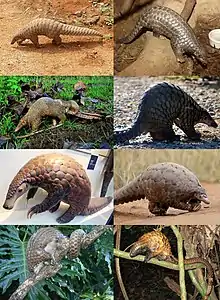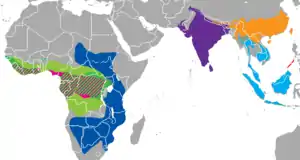Manidae
Manidae is the only extant family of pangolins from superfamily Manoidea.[5] This family comprises three genera (Manis from subfamily Maninae, Phataginus from subfamily Phatagininae, and Smutsia from subfamily Smutsiinae),[1] as well as extinct Fayum pangolin.[6]
| Manidae | |
|---|---|
 | |
| Living speacies of pangolins | |
| Scientific classification | |
| Kingdom: | Animalia |
| Phylum: | Chordata |
| Class: | Mammalia |
| Clade: | Pholidotamorpha |
| Order: | Pholidota |
| Suborder: | Eupholidota |
| Superfamily: | Manoidea |
| Family: | Manidae Gray, 1821[3] |
| Type genus | |
| Manis | |
| Genera | |
| |
 | |
Species ranges:
| |
| Synonyms | |
|
list of synonyms:
| |
Classification and phylogeny
History of classification
All species of living pangolin had been assigned to the genus Manis until the late 2000s, when research prompted the splitting of extant pangolins into three genera: Manis, Phataginus and Smutsia.[5][7]
Taxonomy
- Family: Manidae (pangolins)
- Subfamily: Maninae (Gray, 1821)
- Genus: Manis (Linnaeus, 1758) (Asiatic pangolins)
- Manis crassicaudata (Gray, 1827) (Indian pangolin)
- Manis pentadactyla (Linnaeus, 1758) (Chinese pangolin)
- †Manis hungarica (Kormos, 1934)
- †Manis lydekkeri (Dubois, 1908)
- Subgenus: Paramanis (Pocock, 1924)
- Manis javanica (Desmarest, 1822) (Sunda pangolin)
- Manis culionensis (de Elera, 1895) (Philippine pangolin)
- †Manis paleojavanica (Dubois, 1907)
- Genus: Manis (Linnaeus, 1758) (Asiatic pangolins)
- Subfamily: Phatagininae (Gaubert, 2017) (small African pangolins)
- Genus: Phataginus (Rafinesque, 1821) (African tree pangolins)
- Phataginus tetradactyla (Linnaeus, 1766) (Long-tailed pangolin)
- Phataginus tricuspis (Rafinesque, 1821) (Tree pangolin)
- Genus: Phataginus (Rafinesque, 1821) (African tree pangolins)
- Subfamily: Smutsiinae (Gray, 1873) (large African pangolins)
- Genus: Smutsia (Gray, 1865) (African ground pangolins)
- Smutsia gigantea (Illiger, 1815) (Giant pangolin)
- Smutsia temmincki (Smuts, 1832) (Ground pangolin)
- Genus: Smutsia (Gray, 1865) (African ground pangolins)
- Incertae sedis
- †manidae sp. [DPC 3972 & DPC 4364] (Gebo & Rasmussen, 1985) (Fayum pangolin)
- Subfamily: Maninae (Gray, 1821)
Phylogeny
Phylogenetic position of family Manidae within superfamily Manoidea.[5][7][8][9][1]
| Pholidotamorpha |
| ||||||||||||||||||||||||||||||||||||||||||||||||||||||||||||||||||||||||||||||||||||||||||||||||||||||||||||
(Pholidota sensu lato) |
References
- Philippe Gaubert, Agostinho Antunes, Hao Meng, Lin Miao, Stéphane Peigné, Fabienne Justy, Flobert Njiokou, Sylvain Dufour, Emmanuel Danquah, Jayanthi Alahakoon, Erik Verheyen, William T Stanley, Stephen J O’Brien, Warren E Johnson, Shu-Jin Luo (2018) "The Complete Phylogeny of Pangolins: Scaling Up Resources for the Molecular Tracing of the Most Trafficked Mammals on Earth" Journal of Heredity, Volume 109, Issue 4, Pages 347–359
- "The CITES Appendices". Convention on International Trade in Endangered Species of Wild Fauna and Flora. CITES. Retrieved 28 January 2019.
- J. E. Gray. (1821.) "On the natural arrangement of vertebrose animals." The London Medical Repository Monthly Journal and Review 15:296-310
- J. E. Gray. (1825.) "An outline of an attempt at the disposition of Mammalia into Tribes and Families, with a list of genera apparently appertaining to each Tribe." Annals of Philosophy, new series 10:337-344
- Gaudin, Timothy (2009). "The Phylogeny of Living and Extinct Pangolins (Mammalia, Pholidota) and Associated Taxa: A Morphology Based Analysis" (PDF). Journal of Mammalian Evolution. Heidelberg, Germany: Springer Science+Business Media. 16 (4): 235–305. doi:10.1007/s10914-009-9119-9. S2CID 1773698.
- Daniel Gebo, D. Tab Rasmussen (1985.) "The Earliest Fossil Pangolin (Pholidota: Manidae) from Africa" Journal of Mammalogy 66(3):538
- Kondrashov, Peter; Agadjanian, Alexandre K. (2012). "A nearly complete skeleton of Ernanodon (Mammalia, Palaeanodonta) from Mongolia: morphofunctional analysis". Journal of Vertebrate Paleontology. 32 (5): 983–1001. doi:10.1080/02724634.2012.694319. ISSN 0272-4634. S2CID 86059673.
- Du Toit, Z.; Grobler, J. P.; Kotzé, A.; Jansen, R.; Brettschneider, H.; Dalton, D. L. (2014). "The complete mitochondrial genome of Temminck's ground pangolin (Smutsia temminckii; Smuts, 1832) and phylogenetic position of the Pholidota (Weber, 1904)". Gene. 551 (1): 49–54. doi:10.1016/j.gene.2014.08.040. PMID 25158133.
- du Toit, Z.; du Plessis, M.; Dalton, D. L.; Jansen, R.; Paul Grobler, J.; Kotzé, A. (2017). "Mitochondrial genomes of African pangolins and insights into evolutionary patterns and phylogeny of the family Manidae". BMC Genomics. 18 (1): 746. doi:10.1186/s12864-017-4140-5. PMC 5609056. PMID 28934931.
External links
- ZSL Pangolin Conservation
- Pangolin: Wildlife summary from the African Wildlife Foundation
- Tree of Life of Pholidota
- National Geographic video of a pangolin
- Proceedings of the Workshop on Trade and Conservation of Pangolins Native to South and Southeast Asia (PDF)
- The Phylogeny of Living and Extinct Pangolins (Mammalia, Pholidota) and Associated Taxa: A Morphology Based Analysis (PDF)
- Bromley, Victoria (Director/Producer), Young, Nora (Narrator/Host), Diekmann, Maria (2018). Nature: The World's Most Wanted Animal. United States: PBS.
- Coronavirus: Revenge of the Pangolins? The New York Times, March 6, 2020.
This article is issued from Wikipedia. The text is licensed under Creative Commons - Attribution - Sharealike. Additional terms may apply for the media files.